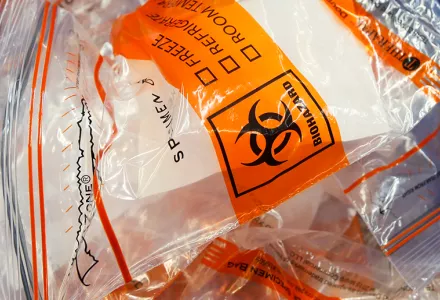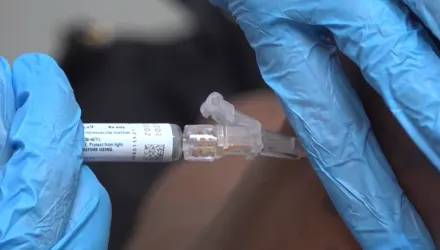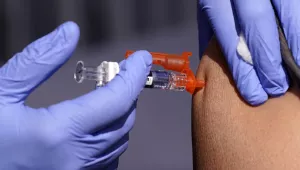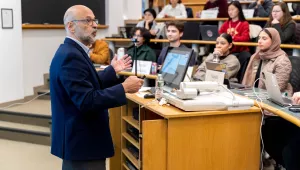
As of this week, over 115,000 Americans have died from the Coronavirus disease. Globally, approximately 450,000 people are reported to have perished – though that number is likely much higher. The current crisis is far from over, with cases still increasing in many parts of the United States and around the world, and predictions of multiple waves and many more deaths ahead, along with long term health consequences that physicians are only beginning to discern. As bad as the current crisis is, there is a pernicious prospect for which we are even less prepared: a deliberate wide scale biological attack by an adversary.
The disproportionate number of American deaths from the COVID-19 pandemic has made it clear that the United States is woefully underprepared to deal with naturally occurring biological threats. However, the weaponization of diseases could present an even tougher and more paralyzing challenge for our nation. As detailed in a 2016 report by the President’s Council of Advisors on Science and Technology, over the last decade increasingly sophisticated bio and genetic engineering technologies have given nation-states and technically-competent individuals the potential ability to create new types of weapons of mass destruction.
The U.S. Government spends billions of dollars annually on biosecurity and although progress has been made these efforts have remained fragmented and are not scaled to the nature of the emerging challenge. Effectively managing an emerging pandemic or deliberate biological attack requires a coordinated response bringing together global capabilities for detecting and understanding the threat, diagnosing cases, isolating infected people and tracing recent contacts, developing vaccines and precision medicines, and effectively testing, vaccinating, and treating large populations. And in the case of a biological attack we would also most likely be dealing simultaneously with the risk of “reload” – meaning further attacks in process or on the way.
Biological threats know no boundaries. The world needs the United States to provide leadership now to create and deploy a global biosecurity initiative modeled on the type of national and global network that we already use to protect the US and our allies from the threats of nuclear, radiological, and chemical attacks by nation states or terrorists: sophisticated sensors, intelligence gathering, highly-trained and ever-ready emergency response teams, and, urgently, technologies and methods to mitigate such threats. And if the United States doesn’t play this role, it will be the net loser too.
Currently the Federal government, state and local governments, our public health system, and the international community are not sufficiently organized and coordinated. Compounding our challenges, the pharmaceutical industry model of drug discovery and production is also not up to the task: according to a recent report by the Deloitte Centre for Health Solutions, the discovery and development of a patient-ready medicine takes on average over 10 years and costs approximately $2 billion. Despite burgeoning global research collaboration, and some recent encouraging signs, most scientists believe that it will take 18 months or more to develop and fully deploy an effective COVID-19 vaccine.
As the COVID-19 pandemic demonstrates, our ability to dramatically shorten the vaccine and drug discovery and development process is a key component of a national biosecurity initiative — and it is literally a matter of life and death, as well as the recovery of our economies and reopening of our societies. There are three key hurdles hampering accelerated therapeutic development: (1) the long discovery time for identification of novel candidate molecules; (2) the need for extensive experimental testing for safety and efficacy that must be completed before novel medicines can be widely used; and (3) the requirement to build capacity for large-scale testing, production, and distribution of new medicines.
Accelerating therapeutics development requires the establishment of a complex interdisciplinary R&D enterprise that leverages skills and capabilities for coordinated multi-institution R&D, molecular modeling, high performance computing, artificial intelligence, bioengineering, complex in-vitro experimental models, and pathogen bioscience. This depends on broad coordination of subject matter experts, facilities and extensive academic and private industry partnerships. It also requires extensive coordination and cooperation between the White House, federal agencies, state and local governments, foreign governments and institutions, and the private sector.
This would seem to be a daunting task, particularly at a time when polls indicate that many Americans have lost trust in their government and other important institutions. But our Federal enterprise has unparalleled resources that stand ready to surge capacity – as they did during the Ebola epidemic of 2014-2016. For example, the U.S. Department of Energy (DOE) operates 17 multi-program National Laboratories that include world-leading capabilities in physical science and engineering, high performance computing, and precision instrumentation. These labs, and the scientists that work within them, are an enormous resource that we should utilize in building and deploying a national biosecurity initiative.
Several of the National Labs are currently working closely with the National Institute of Health, the Center for Disease Control, Frederick National Lab, and others on responses to COVID-19. They are also partnering with private sector technology companies through the recent National Supercomputing Consortium and through the Accelerating Therapeutics for Opportunities in Medicine (ATOM) consortium, which is a public-private partnership focused on dramatically accelerate drug discovery using high performance computing, AI, and advanced data analytics.
We should build upon and formalize the increased collaboration that has developed in confronting the COVID-19 pandemic to better equip the nation and our allies to deal with future pandemics and biological attacks. DOE’s national labs can provide precision measurements of molecules and supercomputing-based simulation and analysis of complex biomedical processes; NIH and the academic community can bring deep understanding of biology and its translation to patients; and pharmaceutical and biotechnology companies can contribute the expertise and manufacturing capabilities required to scale therapeutics for global needs. This expertise needs to be integrated with defense, intelligence, and emergency response and recovery capabilities into a coherent, well-funded, and nonpartisan program led by an experienced leader with clear lines of authority, responsibility, and accountability.
Before it’s too late, the President and Congress should establish a bold new initiative to position the United States to prevent, prepare for, mitigate and respond to what is inevitably coming our way.
Elizabeth Sherwood-Randall is a Distinguished Professor at Georgia Tech and a Senior Fellow at the Belfer Center. She served from 2014-2017 as U.S. Deputy Secretary of Energy and previously as White House Coordinator for Defense Policy, Countering Weapons of Mass Destruction, and Arms Control.
John MacWilliams is a Senior Fellow at Columbia University’s Center on Global Energy Policy and an Adjunct Professor at the School of Public and International Affairs. He served from 2013-2017 as Associate Deputy Secretary and Chief Risk Officer at the U.S. Department of Energy.
Sherwood-Randall, Elizabeth and John MacWilliams. “The Urgent Need for a National Biosecurity Initiative.” Belfer Center for Science and International Affairs, Harvard Kennedy School, June 18, 2020







